#he's the vicar of christ
Explore tagged Tumblr posts
Text
honestly, the greatest threat to any religion is not the forces that actively seek to destroy it, but rather those that seek to twist it into a weapon to turn on their enemies, or a means of social control. it is much easier to fight an enemy that declares itself an enemy, but one that disguises itself as an ally, or even as your champion, can deceive you into willingly betraying all that your faith stands for, turning it into a farce of the worst kind.
Islam is used for oppression in Islamic countries, Christianity is used for oppression in Western countries, atheism is used for oppression in China, Shinto is used for oppression in Japan, Native religions are used for oppression in our tribes, etc, etc. The point isn't that any or all religion is inherently evil or violent, just that cruel and selfish people seeking power will use anything they can to control others.
#this is why i'm kinda suspicious of a lot of the radtrad movement#not that being traditional is bad; tradition is a beautiful expression of what is best in a religion especially Catholicism#and can bring people to The Faith#but i feel like a lot of the supposed radical traditionalists are acting in bad faith#using#instead of deriving radical beliefs that are truly rooted in Catholic social teaching#and it especially enrages me when I see them attacking Pope Francis in the name of tradition#he's the vicar of christ#if you claim to be Catholic you will treat him with the respect due to his office#the commies may want to stamp out religion in general and the church in particular#but they can only legislate against us or at worst kill us#because they have made their intentions clear#but it is the bad actors#the fascists in sheep's clothing#who can deceive us into abandoning the words of Our Lord#and the teachings of The Church#out of a false sense of zeal for both
3K notes
·
View notes
Text
rant about the definition of Christianity
just found out that a horrifying amount of self-described "Christians" (something like around 50%) in the United States don't believe that Jesus is God. that he's just a prophet or something.

that's the CENTRAL PART of what makes a Christian a Christian; if you do not believe that Jesus is God, you do not meet the definition of Christian. This is not gatekeeping. This is a matter of definition. If you do not accept Christ as "One in Being with the Father", cannot say with complete honesty that Christ is Lord, a theistic Satanist meets the definition of Christian better than you do.
it's like saying "I'm muslim but I think Muhammad was lying through his teeth the whole time" or "I'm a Buddhist but I don't believe in all this reincarnation stuff", or "I'm an Atheist but I believe in God."
"America is a Christian country", what rot. I've been accused of calling everyone heretics too much in the past, and i'll admit perhaps I've been a bit too aggressive. BUT when HALF OF SELF-DESCRIBED "CHRISTIANS" IN THIS BLASTED COUNTRY DON'T EVEN MEET THE BASIC DEFINITION OF CHRISTIAN, CAN YOU BLAME ME FOR BEING QUICK TO BRING OUT THE ACCUSATIONS???
And don't get me started on "Catholics" who deny the True Presence of Jesus in the Eucharist or deny the authority of the Pope. Both the Church and Jesus Himself are very clear on the subject of the True Presence, and I don't care if you don't like Pope Francis, he's still the Vicar of Christ, and if you claim to be Catholic you will speak of him with the respect due to his station.
102 notes
·
View notes
Text
The Voltaire-Rousseau Beef aka V v. JJ part III.
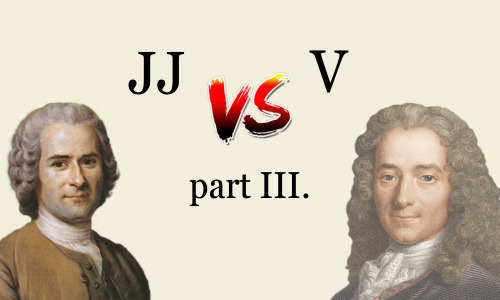
for @stars-in-the-night , @headsinsand and other great (and amazingly patient) readers
part 1 ; part 2 ; part 3 ; part 4
7. THE ORPHANAGE (to be read in Eliza Hamilton's voice)
The one thing from his personal life that Rousseau is probably best remembered for is the fact that he gave up all five children he had with his long-term partner, Thérèse, to a Parisian orphanage. One after the other, in what could be called a rapid succession, a simple case of salut and adieu.
The reasons he gave for his behaviour differ from ‘I have fallen with a bad crowd in Paris and this is just what people around me did’ and ‘I basically had no other option anyway’ (not true, he could have married Thérèse and try to make it work. Sure, money was tight, and someone could make a few snarky remarks about the first baby looking surprisingly big for a six-month old or whatever, but these things happened quite regularly. Also, Diderot married his working-class mistress despite his father’s stern disapproval. Just saying) to – now this comes up somewhat later in the Confessions and is significantly darker – ‘I really hated Thérèse’s family and thought it would be better to let my kids be raised by the state than be around them’.
If this was him trying to break a cycle of generational trauma though – perhaps one of the side of his own family as well – I’d argue there were far better ways of going about it. There’s also potentially one even darker, quasi-psychoanalytical reason for this now infamous choice, but it’s probably best to steer clear of Freud. Nothing good usually comes out of it.

Of course, doing something like this would make anyone seem like a douchebag, but a guy famous for writing a treatise on how to best raise children?* Guy who repeatedly argued that the single purpose of a woman’s life is to be a mother? Now that’s a hypocrisy so deliciously juicy that one simply cannot resist sharing it with the world!
*interestingly enough, he insists in the Confessions that he wanted to reveal this information in his On Education (aka Emile), and that in one of the book's passages, he alluded to this episode in such a way that he ‘basically confessed to it already’. I haven’t found that part yet, and I remain somewhat sceptical about whether this is truly the case.
8. SECOND INTERMEZZO: VOLTAIRE THE AVID HATE-READER
V on Julie, or the New Heloise: „silly, middle-class, dirty-minded and boring“
V on Profession of Faith of a Savoyard Vicar: „I read his On Education. These are reasonings of a stupid nurse in four volumes, of which forty pages directed against Christianity. They are among the most daring that have ever been written, [but] by virtue of inconsistency worthy of this head without a brain and this Diogenes* with no heart, he uttered as much abuse against the philosophers, as against Jesus Christ.“ (letter to Damilaville, 1762)

*calling JJ ‘Diogenes’ was definitely a trend in the 1700s, and what seems like V’s go-to insult for him. Calling him a ‘lackey of Diogenes’ does potentially get a bit kink-shame-y though...
9. A MOUNTAIN AND AN AVALENCHE
The last post featured an earthquake in Portugal, now get ready for a distinctly Swiss natural disaster!
To be perfectly fair to Voltaire, although he was certainly not a person who was above spreading gossip, he did have a good reason to publish what he knew about Rousseau and let all hell break loose, since...
in Rousseau’s Letters Written from the Mountain published in 1763, JJ had exposed Voltaire as the author of the infamous Sermon of the Fifty, an anti-christian work that had the potential to get its author into serious trouble. Voltaire could not and would not let this slide – especially when he had the perfect weapon on his hands. Payback time!

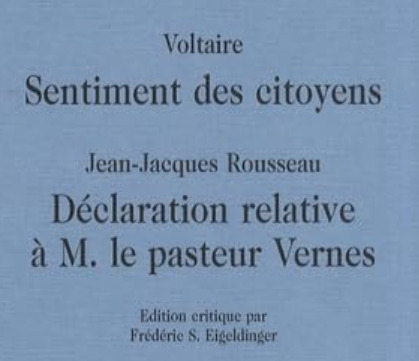
Voltaire therefore went on to publish a short anonymous pamphlet titled Sentiments des Citoyens (aka How Citizens Feel – since JJ proudly called himself ‘citizen of Geneva’ in his works and he championed sentiments over reason – see, it’s all very clever!) in which he exposed details from Rousseau’s personal life. This of course included the most shocking, most hypocritical, and most memorable detail of all: Rousseau, Mr. Family First, Mr. Let’s-raise-precious-children-in-a-way-that-won’t-corrupt-their-natural-godness had dumped all of his offspring into a Parisian orphanage! Not so virtuous now, is it?
Interestingly, Rousseau never put two and two together and realised Voltaire was the real author of the fateful pamphlet. It would be interesting to see how he would react had he known.
That said, much like d’Alembert’s article on Geneva a couple of years earlier, the Sentiments des Citoyens led JJ to pick up a pen once again to do what he did best: to defend the poorest and most oppressed souls against the cruel and unjust world. Which usually just happened to be himself.
And thus, as Roger Pearson, an author of one of Voltaire's many biographies concludes:
“we have Voltaire to thank for (…) being the catalyst of Rousseau’s Confessions” which he calls “one of the world’s great autobiographies”
(no, not like that @chaotic-history. Though now I cannot unsee it every time I read the quote)
->
Tune in next time for the (mis)adventure in Britain which will feature:
another philosopher - David Hume - dragged into the mess
a fake letter from Frederick the Great (that was actually penned by the most messy gossip of a person in the 18th century)
a genuinely funny statue story with an appearance from d'Alembert
#voltaire#rousseau#long post#essay#jean jacques rousseau#tw: jj#philosophy#history#french history#18th century#1700s#age of enlightenment#v#thanks for everyone's patience! part four is just a day or two of reading + writing away#enlightenment#18th century drama#french philosophy
74 notes
·
View notes
Note
OMG PRIEST IN KNIVES OUT IS CERTAINLY GOOD, BUT VICAR MR. ELTON... 🧎🏻♀️🙏 I need to confess all my sins to him and beg for forgiveness, please, and what would it be without his silly smile 😃
MR. ELTON MY BELOVED 🛐🛐🛐🛐
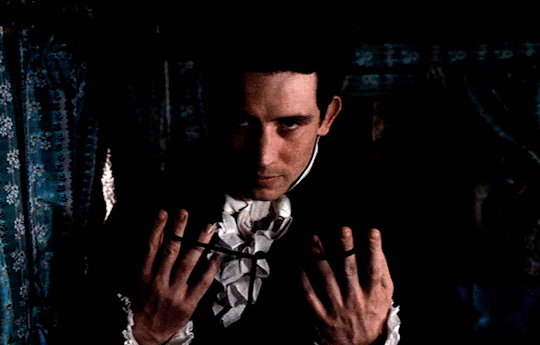
The sheer obscenity of the whole situation, how basically nothing is allowed in the late 18th century, everyone is to be behaving properly and poor you are having all these thoughts. And, what makes it absolutely terrible, all these explicit ideas circle around the young, face-made-in-heaven vicar, the servant of God who's adapted by the whole town. You adore him as well, so deeply that when you pray each evening, you wish he was in your room and stroked your hair as you struggle to fall asleep.
Each Sunday, you sit in the front row of the picturesque little church, eagerly nodding and listening to the each word of the sermon. When he offers the annual time for confession, you linger behind, allowing everyone else to confess to their sins instead.
"Dear child," the way he adresses you has you weak in the knees - thank god you're kneeling right now - and you're really having issues staying calm at the moment. "What seems to be troubling you?"
You join your hands by your chest, bowing your head down to gaze at his feet, heart beating as you suddenly feel so small under the intensity of his warm gaze. "Forgive me for I have sinned, father."
Now calling him that feels incredibly odd to you, considering there is not that huge of an age gap between the two of you, plus the intensity of your mind consuming dreams is like a heavy weight on your back.
"How have you sinned, my child?"
The most vulgar of words are running through your mind, some of them made up as you've never been to speak in the lower class way, but at the moment, you seem unable to come up with a properly former sentence. You feel the pit of hell burning beneath your knees, the eyes of christ drilling a hole into the back of your head. This isn't anything close to the casuality of accidentally showing an ankle or refering to someone with the wrong title.
"I've been having thoughts, father. Odious, ill and mind consuming."
"What exact kind of thoughts?" Mr. Elton asks, the softness of his voice like a caress to your cheek. How are you supposed to say it?
You gulp, fingers still intertwined, nails digging into the soft flesh of your own hands. "Thoughts that are not appropriate for an unwed woman. That should never occur."
Mr. Elton has rarely been exposed to certain vulgar images of female mind, not many women having visited him to confess to such a matter. And for that reason, he is supposed to find it troubling, to find it so obscure that he shouldn't even allow you to speak on such a matter. But something in his mind that has been touched by the finger of a devil, the not so God devoted part that's secretly longing for the basic male need is tempted to converse on such a matter.
However, you are a good christian girl, your father is the mayor of Highbury and he'd be damned for allowing your mind to get swallowed by something so sinful. He has to offer help, the same way he does to all your neighbours and all the people that come to seek his guidance.
"Tell me what exactly is on your mind, child," he demands softly, his voice as steady as his stance.
You gulp, eyes closing in shame as your heartbeat speeds up. This is way worse than if you were to confess to a murder, but once you've taken a bite, you have to eat the whole cake. So you speak. And for the sake of you both, choose to leave out the name of the main star of your fantasies.
"I've been... Imagining- vividly imagining the sight of a bare body, a man's body. And mine as well. Together, close," your voice is so quiet and full of shame that at first, Mr. Elton can barely hear you. With a small hum, he beckons you to continue. "And touching as well, places that shouldn't be touched. Kissing and performing other acts. I have never engager in anything of this kind, father, I don't know where the thoughts are coming from."
He can see you trembling at his feet and the urge to reach in and wipe the small tear that's rolling down your cheek takes over him. His hand shoots out and Mr. Elton manage to stop himself barely in time, the tips of his fingers running over your hairline. You flinch and he almost gasps too, luckily managing to disguise it as drawing a cross on your forehead. "Poor child."
You nod shakily, your heart beating so loud that it fills your ears like a sound of a drum, the whole entirety of the church suddenly suffocating you tightly. Mr. Elton smirks as the sight, your desperation as bright as the sky. He takes very sick and twisted pleasure in this situation, almost wanting to make the best of it, because it's not every day that a good girl like yourself, prim and proper - almost brain washed -, confesses to having such dirty thoughts. Would it be a sin to let you swim in the lake without offering a branch to grasp onto for a big longer?
#mr elton#vicar#emma. 2020#Emma.#jane austen#josh o'connor#josh o'connor blurb#josh o'connor fanfic#ask#josh o'connor x reader#challengers#patrick zweig
51 notes
·
View notes
Text
guys, I watched a horror movie because I was bored and saw Men (2022), and thought it looked interesting...WHY THE FUCK DID i WITNESS 4 BIRTHS BACK TO BACK, HOW DID THE MAN SUDDENLY GET A VAGINA, A MAN BABY CRAWLING OUT, THEN GIVING BIRTH THROUGH HIS FUCKING BELLY BUTTON... AND THEN THE MAN WHO CAME OUT GAVE FUCKING BIRTH THROUGH HIS BACK, A VAGINA SUDDENLY THERE TOO AND THEN THE MAN WHO CAME OUT THERE GAVE BIRTH TROUGH HIS MOUTH, I AM NOT OKAY Also, off topic... the vicar (priest) was kinda bad ngl... the way he got on his knees and groaned and panted like that... jesus christ...making me think unspeakable things
#Also#if you guys can't see#Im getting a bit better#might start writing soon#maybe#bot creator#men#men 2022
19 notes
·
View notes
Text
One thing that I think no one brings up enough is that the Pope released a Prog Rock album. Yes, that Pope. The Bishop of Rome. The Vicar of Christ. The Supreme Pontiff of the Roman Catholic Church. Francis. He released a Progressive Rock album. It’s called Wake Up! Go! Go Forward! and every single song on it is an absolute bop. Just as you'd expect from ol’ Cardinal Bergolio. (I'm sorry for deadnaming His Holiness but I ran out of titles). You should listen to it right now.
But like actually how have we as a society forgotten about a Papal music career. Why aren't people still making jokes about this? It’s hilarious.
11 notes
·
View notes
Text
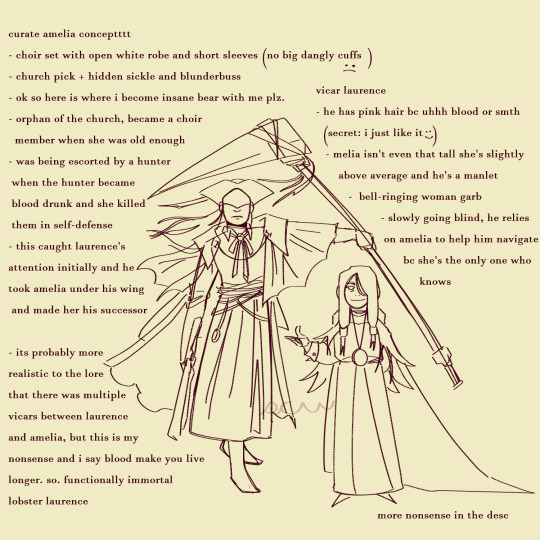
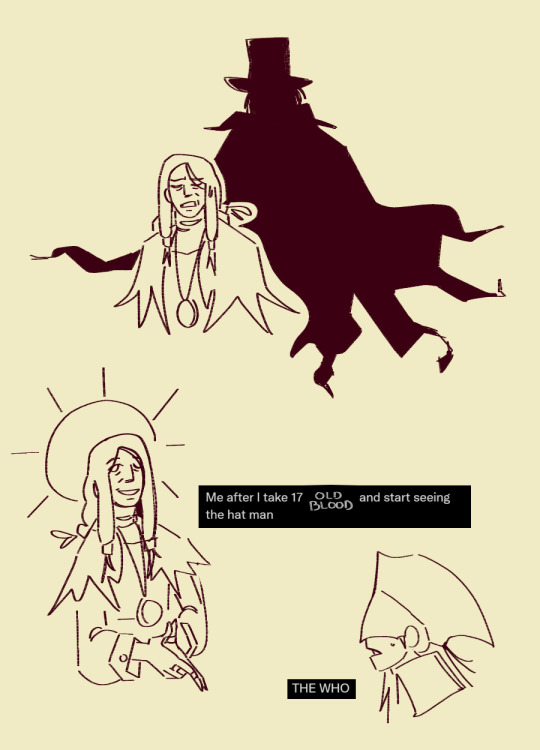

curate amelia n vicar laurence
amelia lore under the readmore (warning: long)
ok so. curate amelia is laurence's successor publicly, but in private she's known by the choir and hunters of the church as the Vicar's Hound. if laurence is suspicious of or annoyed by someone, she will discretely kill them and leave them in a public area as an example (it's blamed on beast attacks but the message is understood)
basically if your coworker ends up mulched one day in the courtyard you know to stay in line or else
shes takes gehrman's old role as his right-hand man so i wanted her to resemble gehrman without cosplaying as him (capey thing, big loose collar) and her church pick is 1. gigantic 2. modeled after the burial blade
brador is supposed to hunt down those who spread the church's secrets but amelia is meant as a bodyguard/intimidation so it doesn't come to that they're similar but different roles i prommy
amelia is the only person laurence trusts. since gehrman left for the dream he's become more paranoid and he trusts her because he has blackmail on her from the hunter she killed, and because of her complete devotion to the church and him
more on why laurence is paranoid in his old age: he used to need glasses before he started using blood ministration on himself and his encroaching beasthood is making his vision fail but he can't get glasses because it would raise questions like 'why is the healing blood not working, whats wrong with the vicar, whats wrong with the church etc', plus that ascending thing isn't going great, his bf is trapped in a pocket dimension, and the beasthood means hes running out of time. thats why he needs a successor, enter amelia, who can also function as personal assassin and bodyguard
laurence likes to think of her as the daughter he and gehrman could have had. part of the reason why he chose her is because she reminded him of himself. sir that's not your daughter you fucked up a perfectly good hunter shes got religious trauma. anyway she's kind of a foil to maria/the doll
amelia's dynamic with laurence is very confused. he's my blackmailer, he's my christ figure, he's my dad, he's my boss, etc.
she was good friends with the hunter she killed, so the blackmail is less 'ill tell on you' and more, 'you can only be absolved of your sins in service to me, what would your friend think of you'
brador hates her. he considers amelia unnecessary and feels like shes usurping some of his position with laurence
when laurence gave in to beasthood and died she was completely out of her depth and was completely unprepared to actually take over after him. some part of her thought he could never really die, such was the depth of her worship
as vicar she has heavy scarring from being there when he transformed, she froze in the face of the beast and couldn't bring herself to fight him
brador killed him instead and thinks she's a coward for not being able to put laurence down, considering it a failure of her faith
he says as much to her face and in grief and retribution her first act as vicar is to lock him up for killing the previous vicar
hes got his bell so he can still do his job, and he eventually dies in his cell and ends up in the nightmare
amelia has no idea what to do when things go to shit so she seals cathedral ward in an attempt to lock the beasts out, but she didn't understand they were already there until it was too late
#bloodborne#soulsborne#fromsoftware#vicar amelia#laurence the first vicar#wheelart#my art#finally. melia loredump.#briefly considered a more grim reaper like look but i couldn't make it work :p maybe later
92 notes
·
View notes
Text

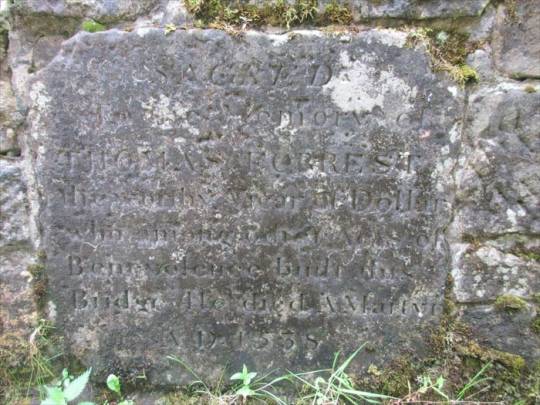
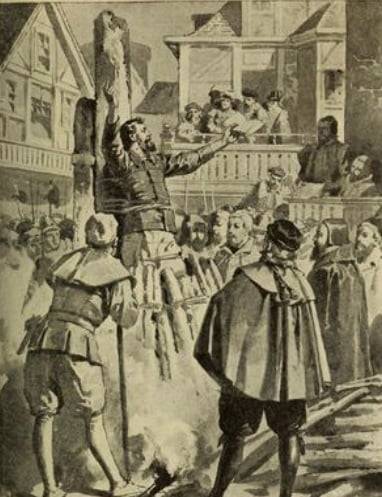
On 28th February, 1539, Thomas Forret, the Vicar of Dollar, John Keillor and John Beveridge, two black-friars, Duncan Simpson a priest, and a gentleman named Robert Forrester, were all burned together on the Castle Hill on a charge of heresy.
The persecution of Protestants in Scotland, at least if measured in martyrdoms, peaked in 1539, shortly after Cardinal David Beaton, a zealous opponent of reform, was appointed primate of the country, although from the info I have picked up one John Lauder, would have been the man condemning these men, he was Scotland’s Public Accuser of Heretics at the times. Heretics being anyone who didn’t follow the Catholic faith.
Of the five “heresiarchs” executed in Edinburgh, none had quite so fascinating a tale as Thomas Forret, an Augustinian monk turned Vicar whose passion for Scripture and preaching, coupled with frank observation of the institutional Church’s doctrinal and practical failings, earned him a place at the stake at the crest of the Royal Mile, just east of Edinburgh Castle.
Forret had been warned by the high heid yins about his behaviour on the pulpit a few times, one occasion said his sermons might lead to “make the people thinke” but, a very smart man, he rebuked the accusations of going against the lords work by quoting scriptures and his quick wit. At the time in Scotland the sermons were traditionally performed by “Black Friars” and “Grey Friars” That’s Dominican and Franciscan Monks to you and I!
It would all come undone in 1539 when Forret attended the wedding of the Priest of Tullibody, which attendance, no less than the marriage itself, flouted the Church’s stance position on clerical celibacy. Forret had added insult to injury by eating meat at his fellow curate’s wedding celebration, despite the fact that it was Lent.
So grievous were Forret’s collective crimes that, at his trial, he was condemned to death “without anie place for recantatioun.”
Subsequently brought to the place of his execution, a certain Friar Hardbuckell encouraged him to save his soul by confessing his faith in God. “I beleeve in God,” Forret replied. Hardbuckell then encouraged him to confess his faith in the Virgin Mary by adding the words “and in our Ladie.” Forret answered, “I beleeve as our Ladie beleeveth,” thereby maintaining to the end the perfect and full sufficiency of Christ’s saving work for sinners.
Forret’s wit and knowledge of Scripture stayed with him to his very last breath. Having been preceded to the gallows by one of his fellow martyrs, Forret called the same a “wily fellow” who wished to arrive at the feast awaiting them in heaven before the others in order to secure a good seat. As the noose was placed around his neck, he began to recite Psalm 51 in Latin: Misere mei, Deus, secundum magnam misericordiam tuam. “Have mercy on me, O God, according to your steadfast love.” Thus he continued “till they pulled the stoole frome under his feete, and so wirried [hanged], and after burnt him.”
Pics are of a memorail stone and bridge over the River Devon between the village of Blairingone and Dollar on the border of Clackmannanshire and Kinross-shire
Much more on the unfortunate man here https://www.reformation21.org/.../scotlands-protestant...
15 notes
·
View notes
Photo

One of the signs of the Second Coming of Our Lord being nigh at hand, will be that no-one will expect it. All the world will be satisfied that things will go on as hitherto for many a century and they will ask – “Where is the promise of His Coming?” In this too, the life of the individual is often a miniature of the history of the world. Christ comes again to many an nexpecting soul when sudden death, through some accident or nsuspected disease, carries off, in a moment, the man who thought he had long years to live. “Blessed is he whom his Lord, when He cometh shall find watching.” +2. Another warning of Our Lord’s approach will be the coming of Antichrist. He will be one, whose authority and power will be a counterfeit of the Vicar of Christ. His distinguishing marks will be overweening pride, hatred of the Catholic Church, widespread dominion, spirit of rebellion which will enlist, in his service, all who revolt against the authority which comes from God . Examine yourself to see if there lurks in you, any of this dislike of lawful authority and pray for the grace of loyalty to men, for God’s sake. +3. Before Our Lord’s Coming, there will be a terrible persecution of he servants of God. In these days, when there is an ever-increasing spirit of tolerance, it is difficult to understand this. But under the spirit of what is called ‘religious liberalism or ecumenism!‘ lurks a deadly hatred of the Church of Christ. It breaks out from time to time, as in the French Commune. It slumbers but now it blazes up again. Pray for grace to withstand all the assaults of the persecutor!
(via Thought for the Day – 17 December – The Signs of His Coming – AnaStpaul)
#st michael#catholic#anastpaul#✝️umblr#chrumblr#catholic tumblr#christianity#last judgement#second coming#jesus christ#roman catholic
3 notes
·
View notes
Text
The 95 Thesis

by Martin Luther
1 When our Lord and Master Jesus Christ said, “Repent” (Matthew 4:17), he willed the entire life of believers to be one of repentance.
2 This word cannot be understood as referring to the sacrament of penance, that is, confession and satisfaction, as administered by the clergy.
3 Yet it does not mean solely inner repentance; such inner repentance is worthless unless it produces various outward mortification of the flesh.
4 The penalty of sin remains as long as the hatred of self (that is, true inner repentance), namely till our entrance into the kingdom of heaven.
5 The pope neither desires nor is able to remit any penalties except those imposed by his own authority or that of the canons.
6 The pope cannot remit any guilt, except by declaring and showing that it has been remitted by God; or, to be sure, by remitting guilt in cases reserved to his judgment. If his right to grant remission in these cases were disregarded, the guilt would certainly remain unforgiven.
7 God remits guilt to no one unless at the same time he humbles him in all things and makes him submissive to the vicar, the priest.
8 The penitential canons are imposed only on the living, and, according to the canons themselves, nothing should be imposed on the dying.
9 Therefore the Holy Spirit through the pope is kind to us insofar as the pope in his decrees always makes exception of the article of death and of necessity.
10 Those priests act ignorantly and wickedly who, in the case of the dying, reserve canonical penalties for purgatory.
11 Those tares of changing the canonical penalty to the penalty of purgatory were evidently sown while the bishops slept (Matthew 13:25).
12 In former times canonical penalties were imposed, not after, but before absolution, as tests of true contrition.
13 The dying are freed by death from all penalties, are already dead as far as the canon laws are concerned, and have a right to be released from them.
14 Imperfect piety or love on the part of the dying person necessarily brings with it great fear; and the smaller the love, the greater the fear.
15 This fear or horror is sufficient in itself, to say nothing of other things, to constitute the penalty of purgatory, since it is very near to the horror of despair.
16 Hell, purgatory, and heaven seem to differ the same as despair, fear, and assurance of salvation.
17 It seems as though for the souls in purgatory fear should necessarily decrease and love increase.
18 Furthermore, it does not seem proved, either by reason or by Scripture, that souls in purgatory are outside the state of merit, that is, unable to grow in love.
19 Nor does it seem proved that souls in purgatory, at least not all of them, are certain and assured of their own salvation, even if we ourselves may be entirely certain of it.
20 Therefore the pope, when he uses the words “plenary remission of all penalties,” does not actually mean “all penalties,” but only those imposed by himself.
21 Thus those indulgence preachers are in error who say that a man is absolved from every penalty and saved by papal indulgences.
22 As a matter of fact, the pope remits to souls in purgatory no penalty which, according to canon law, they should have paid in this life.
23 If remission of all penalties whatsoever could be granted to anyone at all, certainly it would be granted only to the most perfect, that is, to very few.
24 For this reason most people are necessarily deceived by that indiscriminate and high-sounding promise of release from penalty.
25 That power which the pope has in general over purgatory corresponds to the power which any bishop or curate has in a particular way in his own diocese and parish.
26 The pope does very well when he grants remission to souls in purgatory, not by the power of the keys, which he does not have, but by way of intercession for them.
27 They preach only human doctrines who say that as soon as the money clinks into the money chest, the soul flies out of purgatory.
28 It is certain that when money clinks in the money chest, greed and avarice can be increased; but when the church intercedes, the result is in the hands of God alone.
29 Who knows whether all souls in purgatory wish to be redeemed, since we have exceptions in St. Severinus and St. Paschal, as related in a legend.
30 No one is sure of the integrity of his own contrition, much less of having received plenary remission.
31 The man who actually buys indulgences is as rare as he who is really penitent; indeed, he is exceedingly rare.
32 Those who believe that they can be certain of their salvation because they have indulgence letters will be eternally damned, together with their teachers.
33 Men must especially be on guard against those who say that the pope’s pardons are that inestimable gift of God by which man is reconciled to him.
34 For the graces of indulgences are concerned only with the penalties of sacramental satisfaction established by man.
35 They who teach that contrition is not necessary on the part of those who intend to buy souls out of purgatory or to buy confessional privileges preach unchristian doctrine.
36 Any truly repentant Christian has a right to full remission of penalty and guilt, even without indulgence letters.
37 Any true Christian, whether living or dead, participates in all the blessings of Christ and the church; and this is granted him by God, even without indulgence letters.
38 Nevertheless, papal remission and blessing are by no means to be disregarded, for they are, as I have said (Thesis 6), the proclamation of the divine remission.
39 It is very difficult, even for the most learned theologians, at one and the same time to commend to the people the bounty of indulgences and the need of true contrition.
40 A Christian who is truly contrite seeks and loves to pay penalties for his sins; the bounty of indulgences, however, relaxes penalties and causes men to hate them — at least it furnishes occasion for hating them.
41 Papal indulgences must be preached with caution, lest people erroneously think that they are preferable to other good works of love.
42 Christians are to be taught that the pope does not intend that the buying of indulgences should in any way be compared with works of mercy.
43 Christians are to be taught that he who gives to the poor or lends to the needy does a better deed than he who buys indulgences.
44 Because love grows by works of love, man thereby becomes better. Man does not, however, become better by means of indulgences but is merely freed from penalties.
45 Christians are to be taught that he who sees a needy man and passes him by, yet gives his money for indulgences, does not buy papal indulgences but God’s wrath.
46 Christians are to be taught that, unless they have more than they need, they must reserve enough for their family needs and by no means squander it on indulgences.
47 Christians are to be taught that they buying of indulgences is a matter of free choice, not commanded.
48 Christians are to be taught that the pope, in granting indulgences, needs and thus desires their devout prayer more than their money.
49 Christians are to be taught that papal indulgences are useful only if they do not put their trust in them, but very harmful if they lose their fear of God because of them.
50 Christians are to be taught that if the pope knew the exactions of the indulgence preachers, he would rather that the basilica of St. Peter were burned to ashes than built up with the skin, flesh, and bones of his sheep.
51 Christians are to be taught that the pope would and should wish to give of his own money, even though he had to sell the basilica of St. Peter, to many of those from whom certain hawkers of indulgences cajole money.
52 It is vain to trust in salvation by indulgence letters, even though the indulgence commissary, or even the pope, were to offer his soul as security.
53 They are the enemies of Christ and the pope who forbid altogether the preaching of the Word of God in some churches in order that indulgences may be preached in others.
54 Injury is done to the Word of God when, in the same sermon, an equal or larger amount of time is devoted to indulgences than to the Word.
55 It is certainly the pope’s sentiment that if indulgences, which are a very insignificant thing, are celebrated with one bell, one procession, and one ceremony, then the gospel, which is the very greatest thing, should be preached with a hundred bells, a hundred processions, a hundred ceremonies.
56 The true treasures of the church, out of which the pope distributes indulgences, are not sufficiently discussed or known among the people of Christ.
57 That indulgences are not temporal treasures is certainly clear, for many indulgence sellers do not distribute them freely but only gather them.
58 Nor are they the merits of Christ and the saints, for, even without the pope, the latter always work grace for the inner man, and the cross, death, and hell for the outer man.
59 St. Lawrence said that the poor of the church were the treasures of the church, but he spoke according to the usage of the word in his own time.
60 Without want of consideration we say that the keys of the church, given by the merits of Christ, are that treasure.
61 For it is clear that the pope’s power is of itself sufficient for the remission of penalties and cases reserved by himself.
62 The true treasure of the church is the most holy gospel of the glory and grace of God.
63 But this treasure is naturally most odious, for it makes the first to be last (Mt. 20:16).
64 On the other hand, the treasure of indulgences is naturally most acceptable, for it makes the last to be first.
65 Therefore the treasures of the gospel are nets with which one formerly fished for men of wealth.
66 The treasures of indulgences are nets with which one now fishes for the wealth of men.
67 The indulgences which the demagogues acclaim as the greatest graces are actually understood to be such only insofar as they promote gain.
68 They are nevertheless in truth the most insignificant graces when compared with the grace of God and the piety of the cross.
69 Bishops and curates are bound to admit the commissaries of papal indulgences with all reverence.
70 But they are much more bound to strain their eyes and ears lest these men preach their own dreams instead of what the pope has commissioned.
71 Let him who speaks against the truth concerning papal indulgences be anathema and accursed.
72 But let him who guards against the lust and license of the indulgence preachers be blessed.
73 Just as the pope justly thunders against those who by any means whatever contrive harm to the sale of indulgences.
74 Much more does he intend to thunder against those who use indulgences as a pretext to contrive harm to holy love and truth.
75 To consider papal indulgences so great that they could absolve a man even if he had done the impossible and had violated the mother of God is madness.
76 We say on the contrary that papal indulgences cannot remove the very least of venial sins as far as guilt is concerned.
77 To say that even St. Peter if he were now pope, could not grant greater graces is blasphemy against St. Peter and the pope.
78 We say on the contrary that even the present pope, or any pope whatsoever, has greater graces at his disposal, that is, the gospel, spiritual powers, gifts of healing, etc., as it is written, [1 Corinthians 12:28].
79 To say that the cross emblazoned with the papal coat of arms, and set up by the indulgence preachers is equal in worth to the cross of Christ is blasphemy.
80 The bishops, curates, and theologians who permit such talk to be spread among the people will have to answer for this.
81 This unbridled preaching of indulgences makes it difficult even for learned men to rescue the reverence which is due the pope from slander or from the shrewd questions of the laity.
82 Such as: “Why does not the pope empty purgatory for the sake of holy love and the dire need of the souls that are there if he redeems an infinite number of souls for the sake of miserable money with which to build a church? The former reason would be most just; the latter is most trivial.
83 Again, “Why are funeral and anniversary masses for the dead continued and why does he not return or permit the withdrawal of the endowments founded for them, since it is wrong to pray for the redeemed?”
84 Again, “What is this new piety of God and the pope that for a consideration of money they permit a man who is impious and their enemy to buy out of purgatory the pious soul of a friend of God and do not rather, because of the need of that pious and beloved soul, free it for pure love’s sake?”
85 Again, “Why are the penitential canons, long since abrogated and dead in actual fact and through disuse, now satisfied by the granting of indulgences as though they were still alive and in force?”
86 Again, “Why does not the pope, whose wealth is today greater than the wealth of the richest Crassus, build this one basilica of St. Peter with his own money rather than with the money of poor believers?”
87 Again, “What does the pope remit or grant to those who by perfect contrition already have a right to full remission and blessings?”
88 Again, “What greater blessing could come to the church than if the pope were to bestow these remissions and blessings on every believer a hundred times a day, as he now does but once?”
89 “Since the pope seeks the salvation of souls rather than money by his indulgences, why does he suspend the indulgences and pardons previously granted when they have equal efficacy?”
90 To repress these very sharp arguments of the laity by force alone, and not to resolve them by giving reasons, is to expose the church and the pope to the ridicule of their enemies and to make Christians unhappy.
91 If, therefore, indulgences were preached according to the spirit and intention of the pope, all these doubts would be readily resolved. Indeed, they would not exist.
92 Away, then, with all those prophets who say to the people of Christ, “Peace, peace,” and there is no peace! (Jer 6:14)
93 Blessed be all those prophets who say to the people of Christ, “Cross, cross,” and there is no cross!
94 Christians should be exhorted to be diligent in following Christ, their Head, through penalties, death and hell.
95 And thus be confident of entering into heaven through many tribulations rather than through the false security of peace (Acts 14:22).
26 notes
·
View notes
Text
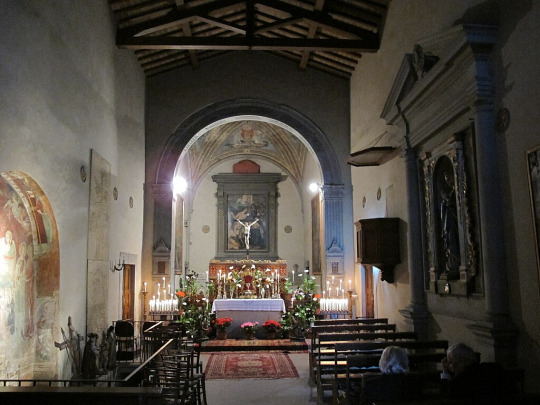

Inside Chiesa San Cristoforo a Novoli, where Marsilio was rector from 1474 through to his death. It was already established by 1069, which is when it starts showing up in extant records.
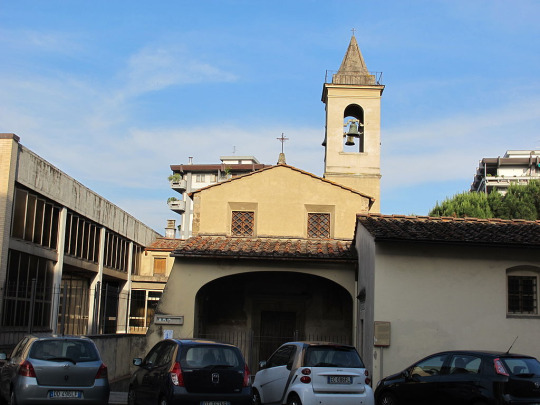
Ficino was elected rector January 6, 1474 by Filippo Sacramoro, vicar of Cardinal Piero Riario, archbishop of Florence. Witnesses included Niccolo Michelozzi (secretary to Lorenzo de’ Medici) and Taddeo Ugolini. The church was under patronage of several families, including the Rinieri.
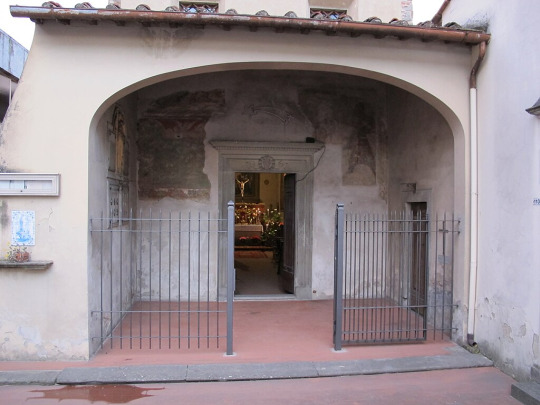
We know from another record, dated October 1475 but referencing January 6, 1474, that Bernardo di Stoldo Rinieri was one of the participants in the election of Ficino, at the behest of Lorenzo de' Medici.
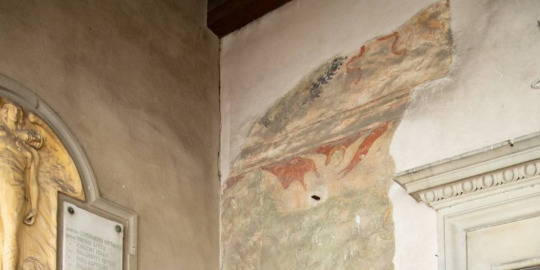
A close up of the left of the small portico - includes a detail of the traces of the 15th century fresco depicting the Annunciation to Joachim (you can see the angel bringing the good news that Anne was going to give birth to Mary, future mother of Christ).
There is also a fresco of Saint Christopher, attributed to a young Franciabigio (he of one of the famous renditions of Bathsheba bathing).
#a tiny church for a tiny rector!!#marsilio ficino#history#renaissance italy#lorenzo de medici#renaissance florence#15th century#art
15 notes
·
View notes
Text
Lucifer’s Shoes in His Demon Form (Headcanon)
N.B. I know it has been revealed what Lucifer wears in his demon form. So this headcanon is a departure from canon.
Lucifer wears red shoes.
Here’s why:
Lucifer wears red shoes to counter the Pope.
In the ancient Roman Empire, red was a color associated with leadership & power. As a result, it associated with those of high social status.
The Pope, who is also the Bishop of Rome, and whose office dignity is far surpass any royal or earthly power according to Catholic teachings, adopted red to his garments (probably after the Edict of Milan in 313 A.D. when the Roman Church “came out from the catacombs” as the persecution ceased with the Edict), my opinion).
The Pope retained the meaning of leadership but also added the meaning of martyrdom, the Passion of Christ and the submission to Christ and following his footstep (hence red shoes). This is the interpretation and symbolism of the color red within Catholicism.
Over time, the Pope adopted the white color, and red representation on his garment decreased. Though the red shoes is one of the red accessories that remained over centuries.
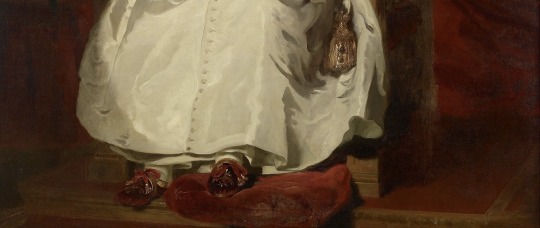
Pope Pius VII (detail), Sir Thomas Lawrence, Royal Collection, Windsor. In the painting, you can see His Holiness wearing red shoes.
You can go Wikipedia/List of popes and browse through the painting portraits of popes, particularly from 16th - mid 20th century, you will see a lot of red (and white of course).
Now, return to the topic at hand, what color do you see on Lucifer’s demon form? Red and black, like the opposite of the Pope, being red and white.
The Pope is the Vicar of Christ, the Representative of God, and also an absolute monarch himself, answerable to no human power (this is recognized by international law) but only to God himself. While Lucifer is the Diavolo’s right hand, one of the Seven Rulers of Devildom, he answers to no power, save for Diavolo.
As such, to counter the Vicar of Christ, the Devil’s Right Hand wears red shoes, symbolizes for power and dominance along with his high societal status in the Devildom. If there is any meaning about sacrifice and submission, it’s the sacrifice he made for his brothers after the Great Celestial War and the submission to Diavolo’s will. His pair of red shoes signifies he will wall this path of power & dominance but also of sacrifice & submission until the end of time.
#obey me#omswd#obey me lucifer#obey me shall we date#obey me one master to rule them all#obey me kinda analysis#obey me headcanons#obey me headcanon#omswd lucifer#swd lucifer
79 notes
·
View notes
Text
i thought about this last night and i wanted to share it here insted of The Belfry server (also this is for my second best friend in the Hunchback fandom @twolionss ) concept: a show about Modern Day AU Frollo's rise and fall from the Diocese of Paris,ive got a trailer script already
(the tralier opens with a shot of the cathedral of Notre Dame)
Frollo (narrating):my parnents wanted me to enter the ranks of the clergy
(Flashback to Frollo priesthood ordination)
Cardinal Lustiger: do you prominse obedience to me and my succserors
Frollo:i promise
(scen switches to Frollo taking in Quasi)
Cardinal Lustiger: Pope John Paul 2 made you a Monsignor,
Frollo: i shall live up to my new titial
Frollo (narrating):life was good until that fathful day
(Scene switches to Frollo in his office at Saint Eugene Parish)
Cardinal Lustiger: Mgr Frollo the new chaplian of Saint Jean High School wants to speak to you
Aupetit: Mgr Frollo my name is Father Michel Aupetit,i heard you have a boy in your care
Frollo: its nobodys damn business how i raise Quasi
Aupetit: one day i Will rescue the boy from the Monster that is you
(Secene switches to the cathedral)
Mgr Luigi Ventura: Lustiger is dead the pope has named Mgr Andre Vingt-trois as the new archbishop of paris
Vingt-trois:im naming Mgr Claude Frollo Vicar General
(Scene switches to Frollo episcopale ordination as auxiliary bishop of paris)
Vingt-Trios: do you promnis obedience to the succssor of Peter
Frollo: i do
Vingt-Trois: recive your Criozer symbol of your Office so you can guide your sheep to clean water
(Scen switches to Frollos Office a few years later)
Ventrua: its me the nuncio i just want to you to know you have been apointed by The holy Father Francis as the new archbishop of Paris "
Frollo: i accept the charge
(Scene switches to Aupetits episcopale ordination by Frollo )
Frollo:recive the mitre so when Christ comes may he see a crown of glory on your head
(Frollo noticis Esmeralda and Ulrich and Aupetit see how he is looking at her)
(Scene switches to the Office of the vicar generals)
Aupetit:Frollo must go
Ulrich:he is a tyrant
Frollo: why do you come to me
Ulrich: i quit im going back to my host diocese of Lille ive seen how you look at that woman
Frollo: YOU CANT QUIT
Ulrich: i just did
Aupetit: i have been named bishop of Nanterre consider this my resignation and ive been writing to the Holy Father about how you just want the red hat
Frollo: MY PARENTS DESTIND ME TO BECOME A CARDINAL
Aupetit: a man who is loud dosent get the red hat
Frollo: i Will be a red vulture one day just you wait
(Scene switches to a meeting of the french bishops conference )
Mgr Pointer: it has come to my attention that Frollo is very rude to his employess he must be removed as soon as possibal and replaced with a man more worthy of the post
(End of trailer)
3 notes
·
View notes
Text
My effort to catch up to where Amias actually is in the game continues. Heart’s Desire spoilers below the cut.
With clues from Tristram and Pages, that’s enough to start looking for Gregory Beechwood at All Christs in Spite. In retrospect, it’s a bit weird that the Bishop wasn’t involved in this one. He could have been swapped with Pages in the order fairly easily, couldn’t he?
I guess he was part of Southwark’s diocese, though:

I had been remembering Saint Fiacre’s as being in Spite, so now I’m confused. Are they both in Spite? Is Spite the Bishop Containment Zone? Are the dioceses just scrambled because of the Treachery of Maps?



Predecessor-by-three? All Christs has a vicar problem, apparently. But more importantly, Cora is here! Let’s see what she has to say. And not keep listening to Church politics. Amias, I fear, has just about zero interest in Church politics. And not very much more interest in churches.
(Once again: yes, Amias, this is why your Scandal is always out of control.)

Amias politely extracts excuses themself; their friend has just walked in. I don’t know why I’m narrating this. It’s just a funny mental image.

Oh, Cora. ;-;
It has to be… difficult, that she assisted in kicking off another game. Even if it’s her best chance to get her brother’s mind away from the Manager. She has to feel some kind of way about helping someone else get in—especially since she must have thought about doing it herself.

Amias is sympathetic too, of course. They don’t need, in the end, to track down a winner who destroyed himself with it—what good would that do anyone? At best, he decided to wash his hands of the whole mess, and leave behind everything he cared about in the process.
They’ve put her through too much already, anyway.

This is. Uh. Well. Every time I go back to it, it hurts (in a proper melancholy way). Amias tries to sympathize, and Cora turns it back around: she feels bad for them, in a vague sad sort of way. She feels bad, probably, for her part in helping them do this. But she doesn’t feel at fault for their decision to play, because they would have found a way with or without her, and they wouldn’t back out now anyway.
This is a tragedy. It’s alright. She knows. She doesn’t hold it against you, that it will end badly. It was always going to. It’s okay.
3 notes
·
View notes
Note
I'm not getting what weir's trying to say with this novel. did i hear right that in her anne book, she went over her death in prolonged agony for kicks and had her literally burning in hell? so it feels like she had an idea what to do with the six wives (clearly), but this mary novel is a fill in the blanks kind of story looking for someone to write about. like pgregs and margaret pole. and the plot doesn't even make sense to me. so she gives mary a troop of weird crushes that go nowhere for padding, and then she's happy with philip and misses him even when he can't give her basic enjoyment. what's she getting out of it?
p.s. if we're going with crushes for mary i don't know why no one makes a thing with philip of bavaria like the tudors did. at least that almost happened.
the implication is there, because while coa and jane receive 'the light' and angels beckoning them, anne's ending is 'merciful darkness descended'. i won't go into detail about the 'prolonged' portion, but she has defended the choice based on... what one could generously call 'research'.
the connection of their faith, and she's attracted to him, i think the suggestion is that she was so innocent and sheltered her entire life that she's not really even aware that there's a pleasure to marriage she's not receiving. which, like, she is a virgin (upon marriage), but you'd think she'd be aware of the prevailing medical opinion of the time, which was that women couldn't conceive without pleasure... tbf, none of the women in her series seem aware of this, which can either be attributed to weir's prudisheness/animosity towards (certain) women.
there is an interesting part, when it comes to philip's excommunication:
"In her anguish, she realized that she would have to choose between the obedience she owed her husband and that which she must render to Christ's vicar on earth [...] 'We will declare war!' [...] At last, they were as one."
whereas, the anguish of choosing between her father's authority and the pope's lasted... well, arguably her whole life, but she acknowledged the church of england's authority by 1536, so... several years? versus thirty seconds? it's interesting, i think the implication here (had weir had the skill to do more with it, that is); is mary's belief in the sacrament of marriage > that authority (it could've led to a greater moment of understanding her mother's obedience to her father insofar as refusing to do anything against his will beyond sustaining the use of her title, which is a source of frustration for her earlier on in the novel), and an allusion to how being anti, or pro, papal could be a matter of political timing > principle. it could even raise the question of how mary might've reacted had the earlier pope during the great matter declared against her legitimacy. would she acknowledge it? because an often unacknowledged aspect of mary's life is that she defied the pope herself during her own reign; her opinions and principles and beliefs on this matter were probably less straightforward than is usually assumed.
#again i just don't think she particularly....likes....anne or mary bcus she parallels a humiliating post-coital scene for both of them#literally the morning after the first time h&a hook up he's like well i'm going to visit my daughter now . no i'm not going to stay here.#and then with mary and philip it's not the first time but there's a tangibly cringe post coital scene where IMMEDIATELY afterwards#he's like so. you need to be nicer to elizabeth. make an effort eahzgifdjksghfj#anon#there's a distinctly different scene in TLE than the same one on this timeline#(december 1536) where she reflects on her mother as well...#it shows how her views have changed on the subject#because other scenes from TLE from mary's pov are basically identical in this iteration
6 notes
·
View notes
Note
Impure thoughts
Unclean acts
Guilty of the smallest sin
She’s my Catholic Sex Kitten
She delivers temptation
I love her more than Jesus
When we pray she always hears us
Impure thoughts
Unholy tastes
An angel's body and a sinner’s face
For the innocent dare not look at her
Take my blood and the body of christ
Sold short on this life
The things we must do to survive
The runt of the litter still standing strong
But not bitter
She’s so sweet but must be so sore
All your sins fulfilled in the eyes of the lord
Time for the confession box
Turn the air blue and knock off his socks
You confess your sins and make vicars hard
You cut up lines with your library card
The vicar sweats holy water
As he watches her with his daughter
Daddy’s little girl, sweet and plain
But backstage you go like a train
[x2]
Hail Mary full of grace
There’s something dripping down your face
Her pants came down, she made her choice
Jesus wept as she got moist
Clutching prayer beads
Thinking of carnal needs
Like a porn star, you’re defiled
The priest is in denial
Clutching prayer beads
Thinking of carnal needs
Will you wear white when you’re taken up the aisle?
Banger
3 notes
·
View notes